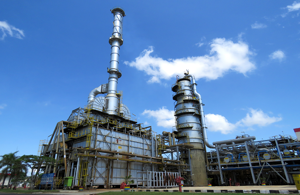bp to use Honeywell’s Ecofining technology to increase SAF production worldwide
Honeywell today announced that bp selected its Ecofining technology to help support the production of sustainable aviation fuel (SAF) at five facilities.
Honeywell UOP Ecofining technology will be installed at bp sites across the globe including the Cherry Point refinery in Blaine, Washington, the Rotterdam II refinery in Rotterdam, Netherlands, the Lingen refinery in Lower Saxony, Germany, the Castellón de la Plana refinery in Castellón, Spain and the Kwinana Oil refinery in Kwinana, Australia.
Ecofining is a proven, ready-now technology. Ecofining’s simplified design provides bp a fast-to-market, capital, and cost-efficient solution to increase bp’s SAF production from renewable feeds and help bp achieve its aim to supply 20% of the SAF market globally by 2030. SAF produced from Honeywell’s Ecofining technology is certified for use according to international standards. It can be used as a drop-in replacement without engine modifications and currently can be used in blends of up to 50 percent with the remainder as conventional (fossil based) jet fuel.
“bp has an established global biofuels business that is positioned for rapid growth utilizing Honeywell’s technology. The world’s demand for SAF is set to increase dramatically and bp seeks to play an important role in helping the airlines to decarbonize,” said Nigel Dunn, senior vice president biofuels growth, bp.
“Demand for Ecofining has more than doubled in the last two years, and Honeywell has now licensed 35 Ecofining plants around the globe with a total production capacity in excess of 400,000 barrels per day,” said Barry Glickman, vice president and general manager, Honeywell Sustainable Technology Solutions. “Honeywell helped pioneer SAF production with its Ecofining process, which has been used to produce SAF commercially since 2016. The Honeywell UOP Ecofining process, developed in conjunction with Eni SpA, converts non-edible natural oils, animal fats and other waste feedstocks to renewable diesel and SAF, and can reduce GHG emissions up to 80% when compared to the emissions from fossil fuels.”
Honeywell offers solutions across a range of feedstocks to meet the rapidly growing demand for renewable fuels, including SAF. In addition to Honeywell UOP Ecofining, Honeywell’s renewable fuels portfolio includes Ethanol to Jet technology and the recently announced Honeywell UOP eFining, which converts green hydrogen and carbon dioxide into e-fuels.
Honeywell recently committed to achieve carbon neutrality in its operations and facilities by 2035. This commitment builds on the company’s track record of sharply reducing the greenhouse gas intensity of its operations and facilities as well as its decades-long history of innovation to help its customers meet their environmental and social goals. About 60% of Honeywell’s new product introduction research and development investment is directed toward products that improve environmental and social outcomes for customers.







Comments